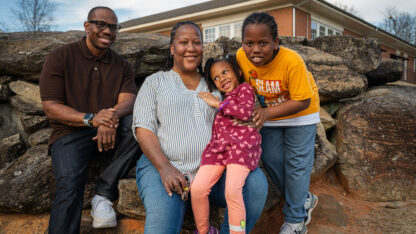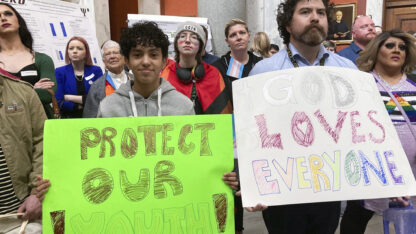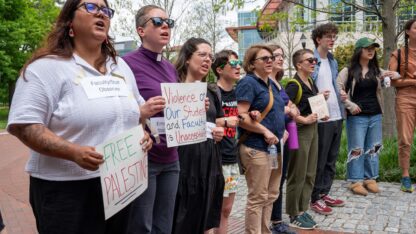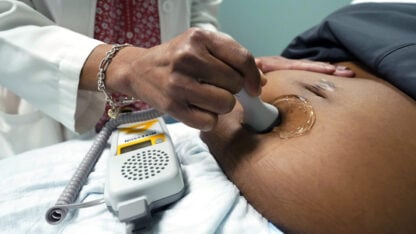Who’s On Medicaid In Georgia? It Might Not Be Who You Think

Anne Ladd looks on as her son Matthew shows off his drumming skills. Matthew, 23, was born with mitochondrial myopathy, a neurodevelopmental disease that limits his movement, sight and speech. Medicaid covers a lot of his care.
Sam Whitehead / WABE
Mothers like to show off their children’s talents, and Anne Ladd is no different. She pulls out a small drum and places it in her son Matthew’s lap.
“He was part of a drum circle for a while,” Ladd said as her son taps away. “We had an active drum circle, which disbanded.”
Ladd says in addition to playing music, her son likes to watch television and listen to books on tape.
The 23-year-old was born with mitochondrial myopathy, a neurodevelopmental disease that limits his movement, sight and speech.
“He is nonambulatory. He has a visual impairment, and he is also nonverbal, so he requires a lot of care,” Ladd said.
And Matthew can receive that care from the comfort of his parents’ home, thanks to Medicaid — specifically, a program aimed at keeping people with developmental disabilities out of institutional settings like nursing homes.
“Having these services that are community-based are a better way of living your life. None of us want to live in a nursing home,” Ladd said. “It also allows his father and I to work. So, we’re able to continue to be productive and contributing in our community.”
There’s lots of talk about Medicaid in Georgia these days, especially as state lawmakers consider whether to give Gov. Brian Kemp the ability to tweak and maybe expand the program.
And there are lots of misconceptions about who actually qualifies for the federal insurance program, says Laura Harker, health policy analyst for the Georgia Budget and Policy Institute.
“The majority of the Medicaid population in Georgia is kids,” she said. “After that, the largest category is people who are elderly, blind or disabled.”
Low-income pregnant women also qualify for the program, which is administered locally by the Georgia Department of Community Health.
But in Georgia, if you don’t meet one of those qualifications, you can’t enroll.
“If you don’t have any children and are an adult, you don’t qualify for Medicaid at all,” Harker said. “Unless you can prove that you’re disabled, blind or pregnant.”
Harker says people are often surprised to find out who actually gets Medicaid and who doesn’t. It now covers about 2 million people in the state, or 1 in 5 Georgians, she says.
“There are misconceptions about who’s using the program, who’s benefiting,” said Elise Blasengame, executive director of Healthy Mothers, Healthy Babies Coalition of Georgia.
The organization contracts with the state to provide a database of health care providers in Georgia who accept Medicaid.
Blasengame says while Medicaid is mostly a federal program, decisions about who gets covered are often made by state officials.
“The state has a lot of flexibility in which conditions they want to prioritize and make a requirement for eligibility for Medicaid,” she said.
And Gov. Kemp could use that flexibility to add more people to Georgia’s Medicaid rolls if state lawmakers decide to give him that power this legislative session.








